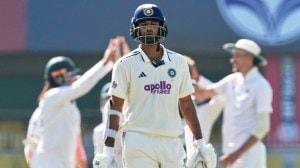WTA may score own goal in numbers game
The crowds at the WTA here have been good news and bad news. Good because of the size, bad because of the noise. To put it in diplomatic ter...

The crowds at the WTA here have been good news and bad news. Good because of the size, bad because of the noise. To put it in diplomatic terms, they don’t follow simple tennis decorum.
Though the organisers Globosport would be happy with the numbers from the turnstiles, given that the last two years saw near-empty stands, tournament director Krishna Bhupathi — father of Mahesh — must be wincing at the behaviour.
‘‘This is maddening, I’ve never seen anything like this’’, said WTA tournament director Clair Woods, as spectators pushed their way through and security officials tried their best to get things in order. ‘‘The players aren’t used to this, they’ve been complaining a lot.’’
‘‘They keep coming’’, said one security guard, mopping the sweat off his brow and fighting his anger. ‘‘I wonder why.’’
Most people in the media were also wondering why, because the crowds probably weren’t here for the tennis. Some, when asked, said they came simply because entry was free. Others said ‘‘Women are playing.’’ A third, not inconsiderably, factor is Sania Mirza playing on home turf.
The sport of tennis is not high on the list.
On Day 1, then crowds strolled around during rallies, least bothered by repeated appeals from the chair umpire.
The next day saw the police resort to a mild lathi-charge at Gate 2. Up in the stands an old man was shoved into his seat, just when a crowd assembled unnecessarily in the area above the baseline.
Outside, Laxmi Rajan and her four-year-old daughter were denied entry. ‘‘I came because I thought this was free’’, she said. ‘‘I stood in the line as asked but ended up being pushed out of line; maybe I should have used force like the rest…’’
Laxmi was only one of several genuine tennis fans who turned away on seeing the unruly crowd.
That left spectators who, as Sania said at a press conference, ‘‘surely do not know the game’’.
Sample this: When Shikha Uberoi hit a huge 10-foot first serve out in her opener, her opponent Melinda Czink hit it, on reflex, into the net. That fetched a long round of applause. ‘‘Good service’’, said the crowd, leaving Shikha bemused.
Rallies that last more than five sets of shots aren’t appreciated and evoke continuous clapping and catcalls.
‘‘It’s not helping either player, even if a home player is on view’’, said Woods. ‘‘They are supportive but need to be educated.’’
Will this be reported? She turned and walked away.
The solution seems to be sale of tickets, perhaps at a high price, to draw in genuine fans. ‘‘At this stage it’s difficult’’, says Bhupathi, adding that the crowd was much larger than expected.



- 01
- 02
- 03
- 04
- 05




























